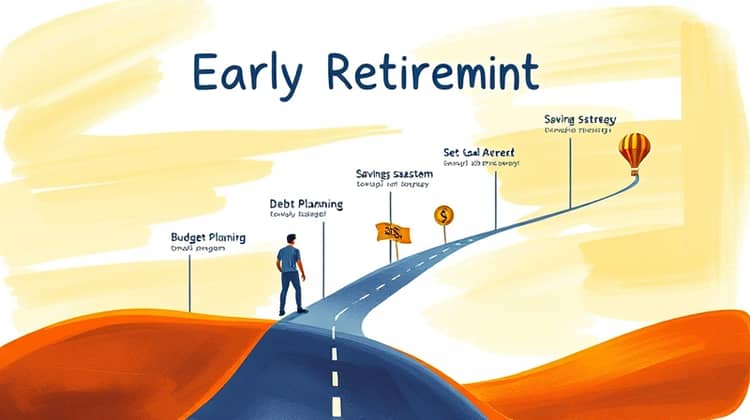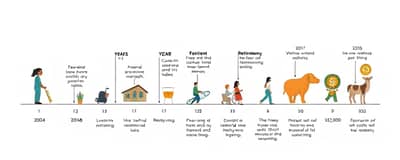Early retirement is a dream that many aspire to achieve. It promises freedom from the daily grind of a traditional 9-to-5 job and the ability to pursue passions and interests that often take a backseat to career commitments. However, whether early retirement is possible or advisable depends on several factors, ranging from financial readiness to personal goals and priorities.
This article aims to provide a comprehensive guide to understanding early retirement, covering essential financial planning, lifestyle considerations, potential challenges, and a step-by-step approach to achieving this aspirational goal.
Understanding Early Retirement

Early retirement typically refers to leaving the workforce before the traditional retirement age, often aiming for the age of 50 or 55. This pursuit has gained popularity in recent years, especially among those who prioritize life experiences over prolonged careers. Nonetheless, achieving early retirement requires careful planning and significant financial resources.
Many wonder if early retirement is feasible for them, and the answer lies in understanding one's financial landscape, desired lifestyle, and aspirations for the future. It is crucial to evaluate the trade-offs that come with early retirement, including how to sustain oneself financially for an extended period without active employment.
- Define what early retirement means for you.
- Consider your current age and savings.
- Identify your desired lifestyle and expenses in retirement.
- Evaluate your health and longevity prospects.
- Assess your potential sources of income after retiring.
Understanding the principles of early retirement is just the starting point. Individuals who successfully retire early often engage in a rigorous financial planning process to ensure they can sustain their lifestyles without traditional employment income.
By identifying your goals and what you hope to achieve during your early retirement, you set the stage for determining the feasibility of your aspirations.
Financial Planning for Early Retirement

Financial planning is the backbone of any early retirement strategy. It lays the groundwork for achieving the necessary financial stability to sustain a comfortable lifestyle without regular employment. Without a solid financial plan, early retirement can quickly turn into an unmanageable burden.
1. Assess Your Current Financial Situation
Before embarking on your journey to early retirement, take a moment to assess where you currently stand financially. Understanding your net worth, income, expenses, and savings can give you important insights into what adjustments may be necessary to reach your early retirement goals.
Conduct a comprehensive review of your financial statements and asset allocations, and make sure to include all the relevant income sources and liabilities. This assessment is vital to identifying gaps and areas for improvement.
- Calculate your total assets and liabilities to determine net worth.
- Make a list of all income sources, including salaries, rental properties, and passive income.
- Track monthly expenses to identify areas where savings can be optimized.
- Review your current savings rate and investment contributions.
- Consider your current savings account interest rates and investment returns.
Finding yourself in a stable financial position is crucial. It allows you to create a plan that affords you the luxury of early retirement. Knowing your numbers also empowers you to make informed decisions about budgeting and future investments, setting you on the right path to your goal.
An accurate assessment provides a foundation upon which you can build your early retirement strategy, showcasing realistic expectations of what is achievable based on your existing financial situation.
2. Create a Detailed Retirement Budget
A well-thought-out retirement budget plays a vital role in ensuring that your early retirement aligns with your financial realities. Careful attention to anticipated expenses post-retirement allows you to create a budget that reflects both your needs and aspirations.
When developing a retirement budget, consider all dimensions of your future lifestyle, such as housing, healthcare, travel, and leisure activities. This comprehensive view will guide you in establishing an appropriate savings target.
3. Savings and Investments
Once you have outlined a retirement budget, it is essential to build a robust savings and investment strategy to fund this vision of retirement. This strategy should encompass various forms of investment, from retirement accounts to diversified portfolios that maximize potential returns while minimizing risk.
Having a plan for adequate savings and investments not only provides peace of mind but also increases the likelihood of financial security in your post-career years.
- Maximize contributions to retirement accounts like 401(k) and IRA.
- Consider low-cost index funds or target-date funds for diversification.
- Set up an emergency fund to cover unexpected expenses during retirement.
- Explore real estate investment options for alternative income streams.
- Regularly review and adjust your investment portfolio based on market conditions.
A dynamic approach to savings and investments is essential as market conditions fluctuate and personal circumstances change. Stay proactive in adjusting your investment strategy to ensure that your retirement funds remain aligned with your goals.
Ultimately, understanding the importance of diligent savings and smart investments can significantly impact your readiness for a comfortable early retirement.
4. Reduce Debt
Reducing or eliminating debt before retiring helps create a more secure financial footing in retirement. Debt can weigh heavily on monthly expenses and may significantly limit your financial flexibility as you transition into retirement.
5. Diversify Income Streams
Relying solely on one source of income during retirement may be a risky strategy. Instead, consider diversifying your income streams to ensure you have a stable financial base. Multiple streams of income can provide a buffer against market volatility and unexpected expenses.
Think beyond traditional retirement accounts and explore other avenues such as rental properties, dividend-paying stocks, freelance work, or even starting a small business.
6. Health Insurance and Care
Access to quality healthcare becomes paramount in retirement, especially if you retire before becoming eligible for Medicare. Understanding your healthcare options and associated costs is vital in your financial planning effort. Consider the impact that health insurance premiums, co-pays, and other medical expenses will have on your budget as you plan for early retirement.
Consider long-term care insurance as part of your financial strategy to protect against high medical expenses later in life, ensuring that you won't be financially penalized if more extensive care is needed down the road.
Lifestyle Considerations

Transitioning to early retirement means more than just financial adjustments; it also involves lifestyle changes. Prepare for a significant departure from the daily structure that work provides and consider how you'll fill your time.
Think about how your daily routine might shift and the activities you'll prioritize. Having interests and goals helps maintain satisfaction and purpose in life after work.
- Pursue hobbies and interests you might have neglected.
- Consider volunteer opportunities to give back to the community.
- Engage in fitness activities to maintain health and wellness.
- Explore new skills or educational pursuits to keep your mind active.
- Plan travels or adventures you've always dreamed of.
Mindfully planning how you will spend your time in early retirement is crucial for maintaining fulfillment and happiness post-career. You may find that the freedom to explore your passions can bring tremendous joy and satisfaction after decades of work.
Challenges and Risks

While the allure of early retirement is undeniable, it's essential to recognize the challenges and risks you might encounter along the way. One significant risk is the potential for underestimating your expenses or overshooting your income projections, both of which can lead to financial strain in retirement.
Additionally, early retirees may face difficulties adjusting to a life without the daily structure of work. Feelings of isolation and loss of purpose can often creep in, making it all the more important to develop a plan for a fulfilling and meaningful retirement experience.
Steps to Achieve Early Retirement

now that we have explored the financial and lifestyle aspects of early retirement, let’s break down the key steps to help put your plans into action.
- Set clear retirement goals and timelines.
- Conduct a thorough financial assessment.
- Create a savings and investment strategy.
- Establish a realistic retirement budget.
- Eliminate or manage debt effectively.
These steps can serve as a roadmap, guiding your journey toward early retirement while ensuring that you are financially prepared and mentally ready for this transition.
Is Early Retirement Right for You?

Determining whether early retirement is suitable for you involves a look at both your financial stability and lifestyle preferences. It is crucial to assess not only your economic situation but also what you value most in your life. Reflecting on your personal goals and motivations will clarify whether stepping away from a traditional career path aligns with your long-term aspirations.
Ultimately, a successful retirement is about striking the right balance between financial wellness and personal fulfillment.
Conclusion

In conclusion, early retirement is an attainable possibility for many, but it requires thorough planning, financial acumen, and a clear sense of direction. Understanding the intricacies involved—from budgeting to income diversification—can set you on a path to achieving your dream retirement.
If you approach early retirement with realistic expectations and a willingness to adapt, you may find that the rewards of living life on your own terms are well worth the effort.














